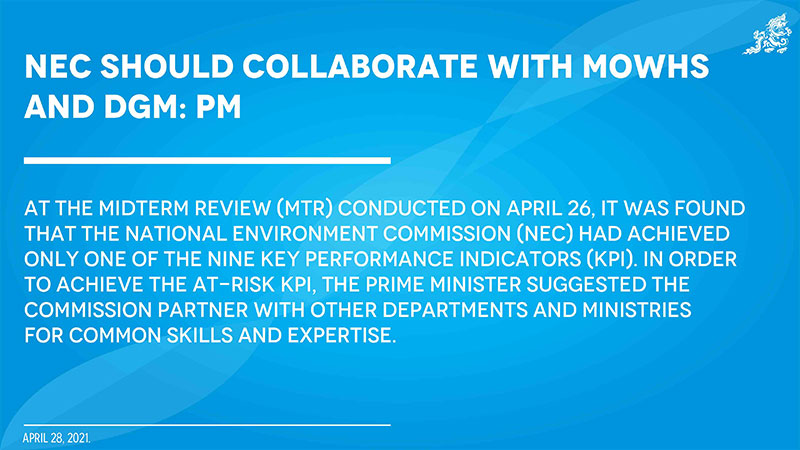Choki Wangmo
Out of nine key performance indicators (KPI), the National Environment Commission (NEC) has achieved one KPI, seven are on track, and one is at risk.
This was reported at the midterm review (MTR) conducted on April 26.
NEC’s officiating secretary, Phento Tshering, said that due to lack of resources and funds, the commission couldn’t assess water availability of surface and groundwater in selective dzongkhags.
He said that NEC proposed the assessment in selective dzongkhags to the government but the budget was not approved in the last fiscal years.
Due to Covid-19, the budget proposal to Bhutan Trust Fund for Environmental Conservation was earlier endorsed by the Gross National Happiness Commission but he said that it was later diverted to Covid-19 related activities.
NEC revised the target to two dzongkhags and requested an ensured budget.
Lyonchhen Dr Lotay Tshering instructed the commission to collaborate with the Department of Geology and Mines and works and human settlement ministry’s engineering section for shared skills and expertise to achieve the KPI at risk. “The Ministry of Works and Human Settlement can provide technical skills and NEC can work on policy related issues.”
NEC also proposed activities such as assessing implications and benefit for Bhutan under the post 2020 global biodiversity framework for its newly established Biodiversity and Land Use Division.
The division was created upon the recommendations of the organisational development (OD) exercise of the Royal Civil Service Commission (RCSC).
However, finance secretary Nim Dorji said the new division might duplicate works of the Department of Forests and Park Services and National Biodiversity Centre. “The division could create a research and development forum and make the resources available to everyone.”
Phento Tshering clarified that there won’t be duplication of roles since NEC is a policy making and coordination agency while NBC and forest department are implementing agencies.
He said the commission does not have human resources with multidisciplinary skills and knowledge to look into proposals that have incomplete information and technical details. “Having an expert would expedite environment clearance issuance.”
Lyonchhen instructed the RCSC to look into such issues since NEC required specific experts unlike other organisations.
From an initial budget outlay of Nu 450 million, NEC has utilised 46 percent of it. The waste management flagship programme has used 44 percent of the total budget of Nu 1 billion.
Meanwhile, for the annual performance agreement, NEC has proposed for establishment of four regional offices in Mongar, Trongsa, Thimphu, and Phuentsholing.
The Prime Minister instructed the Cabinet secretary Sangay Duba to carry out an in-depth study on the need for regional offices in comparison with other regional offices, which are currently underutilised.


